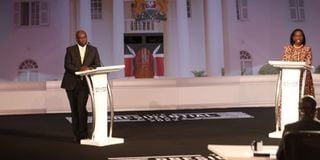Premium
34 million Kenyans watched Rigathi-Karua debate

Kenya Kwanza presidential running mate Rigathi Gachagua (left) and his Azimio counterpart Martha Karua during deputy presidential debate 2022 at CUEA on July 19 2022.
At least 34 million Kenyans watched the deputy presidential debate, organized by the Media Council of Kenya, Media Owners Association and the Kenya Editors Guild, live.
A research conducted by the Media Council of Kenya shows that over 82 percent of Kenyans either watched or listened to the debate on television or radio as well as on social media.
Of this figure, about 70 percent watched the second debate pitting Kenya Kwanza running mate Rigathi Gachagua against Martha Karua of Azimio la Umoja One Kenya Coalition party, the research shows.
Another 30 percent watched both debates including that of Roots party running mate Justina Wamae and Ruth Mucheru of Agano party.
Only five percent of those interviewed watched the first debate pitting Ms Wamae against Ms Mucheru. The debates were held on Tuesday this week and were conducted in two sets.
The survey, conducted a day after the debate, through computer assisted telephone interviews, targeted Kenyans above the age of 18 years, and had a confidence margin of 95 percent, said MCK. It sampled at least 1,245 respondents. MCK further says that of those who followed the debate, about 18.5 million are registered voters.
“Three quarter of the viewers or 76 percent, watched the event on television, 19 percent followed on radio while 10 percent, totaling 3.4 million Kenyans, were on social media,” MCK said yesterday.
“Seven million accessed their radios and TV via the internet where YouTube was the main choice of clocking in. 65 percent followed via Facebook at 31 percent,” MCK added.
In terms of TV viewership, at least 65 percent of those interviewed said that they watched the debate on Citizen TV, followed by Inooro TV and NTV at eight percent and KTN and KBC both at seven percent.
On the radio platform, Radio Citizen had the highest number of listeners at about 41 percent, followed by Ramogi radio and Radio Jambo at about seven percent each.
MCK has also warned Kenyans against falling prey to manipulation, especially on social media and online channels which it said had become the preferred medium of interaction and communication among many Kenyans.
The council also advised the media against conducting online polls to uphold information integrity.
“While online consumption of media content is increasingly becoming critical, we are cautioning Kenyans to beware of manipulation pushed by purveyors affiliated to the various political competitors. We noticed a spike in the number of bots participating in online conversations around the debate,” MCK chief executive officer David Omwonyo said.
MCK said that it has also partnered with Media Owners Association and KEG to organize the 2022 gubernatorial running mate debates at the Catholic University of Eastern Africa.





